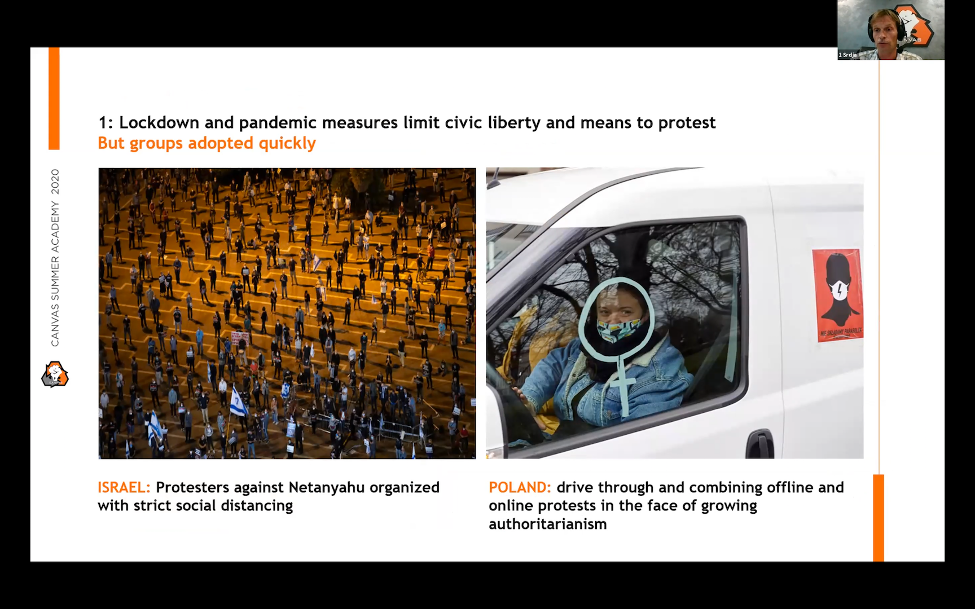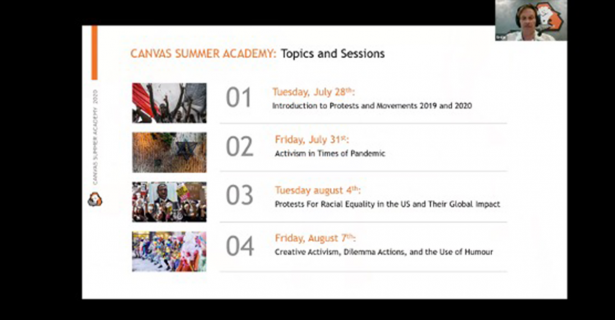Helping organize, create and eventually participating in the CANVAS Summer Academy was the most meaningful part of my experience with CANVAS, an organization focused on promoting and teaching non-violence globally. The Academy consisted of four online and interactive webinars, with activists from all over the world and with CANVAS’ experts. For this blog post, I will focus on two. The topics were varied and relevant; session one reviewed the social movements from 2019 and their current situation in 2020; and session two explained the challenges and opportunities of activism during this pandemic.
For me, I learned a lot about the state of activism in the world through the preparation for the academy and from participating in it. One of the highlights of the first session was learning from Rania Aziz in Sudan. Sudan successfully overthrew their 30-year dictator through a widespread social movement that was mostly dominated by peaceful protests. Another interesting fact is that the revolution was created and led by women. Being able to learn about the tactics and strategies Rania Aziz and her fellow organizers used was invaluable. In addition, because I followed the current situation in Sudan all summer for CANVAS, I could see how the social movement’s tactics and protests were bearing fruit. The transition government recently announced new civilian governors, two of which are women. I also learned of their numerous challenges, among them are the economic situation in the country, as well as the transition from being a revolutionary movement to becoming a government. Ultimately, this was a great experience because I got to learn about a true success in social movements, even if they still have many challenges.
The first session transitioned seamlessly into the second because we learned about the status of social movements today, and how they have adapted to the pandemic. Movements that started last year or earlier have had to change their ways during the pandemic. The second session investigated the opportunity of coronavirus for social movements by bringing in activists from all over the world. We learned from Bolivian, Brazilian, Philippine, Malaysian, and Zimbabwean activists. Again, I had personally been following these countries for CANVAS the whole summer, so it was great to learn from people on the ground.

The most important concept here was that activists were not necessarily protesting during coronavirus, but they were acting as humanitarian organizations, providing food and basic essentials to those in need or educating people on proper health practices. This allowed them to step in, help, and meet people who felt abandoned by their governments’ lackluster response to the coronavirus pandemic. In some ways, this was even more effective than simple protests because it created goodwill and bonds between the activists and the people they supported and connected with, especially in the face of a government who is not supporting them. I felt that this was extremely relevant for all of the listeners because it presented tangible actions that activists can take to build their movement during this time of social distancing and stay at home orders.
Overall, I really enjoyed the CANVAS Summer Academy because it represented the culmination of the work I had being helping CANVAS with for the previous two months. I had been following many movements across the world, and I also helped compile some of the content for the sessions. Thus, once the programs started, I felt like I had prepared myself the best I could to learn from these activists, who had many lessons to teach about their challenges, their solutions, and their paths forward.

